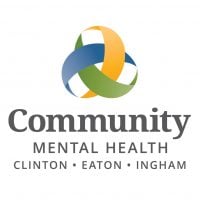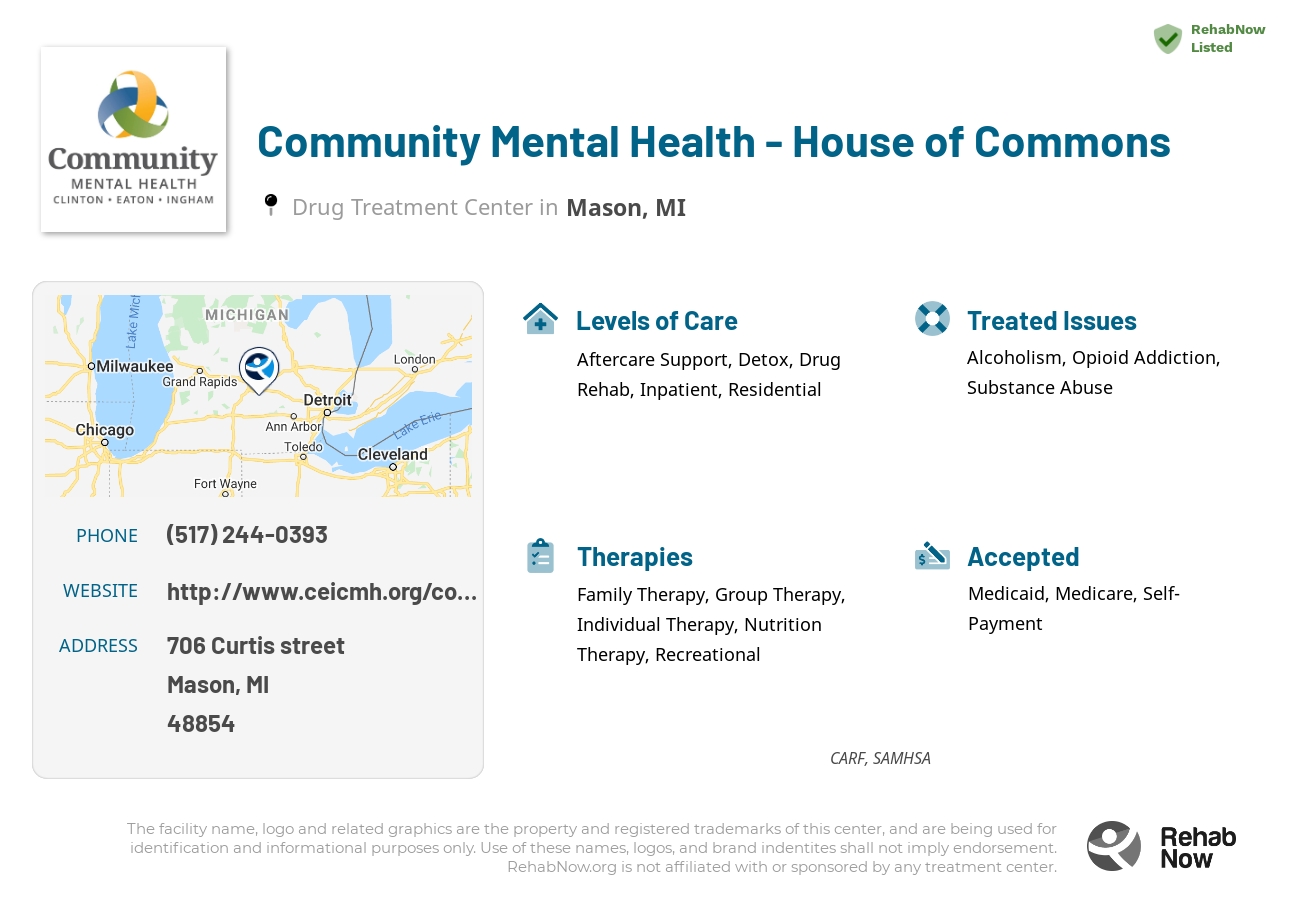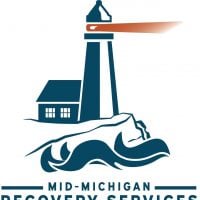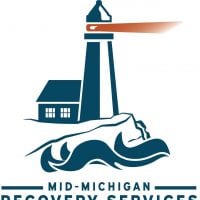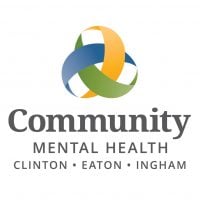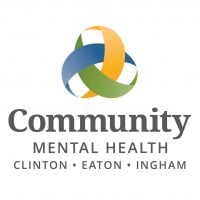About Community Mental Health - House of Commons in Michigan
Located in Mason, Michigan, House of Commons is dedicated to offering long-term residential treatment to men battling drug and alcohol addiction. With a focus on individualized and group therapy, this center stands out for its commitment to a recovery-oriented, culturally competent, and trauma-informed approach. It notably includes a six-month follow-up day program, providing uniquely comprehensive care within its 40-bed facility.
Community Mental Health - House of Commons boasts certifications from JCAHO, CARF, and SAMHSA, ensuring high-quality care for its clients. This facility is recognized for providing a broad spectrum of treatments including detoxification, inpatient and residential services, and aftercare support, tailored to men 18 and older who are seeking to conquer their addictions.
- Long-term residential treatment is a cornerstone, focusing on the holistic recovery of men from addiction.
- A six-month follow-up day program reinforces sustained recovery, a testament to their commitment beyond initial treatment.
- Culturally competent and trauma-informed care ensures that every client's background and experiences are respected throughout their recovery journey.
House of Commons addresses a range of addictions including alcoholism, opioid addiction, and substance abuse, utilizing various treatment methods. Clients can expect individualized care plans incorporating counseling, medication management if necessary, therapeutic activities, and skills for relapse prevention, all delivered within a supportive and structured environment.
Genders
Ages
Modality
Additional
Accreditations
SAMHSA

CARF
The Commission on Accreditation of Rehabilitation Facilities (CARF) is a non-profit organization that specifically accredits rehab organizations. Founded in 1966, CARF's, mission is to help service providers like rehab facilities maintain high standards of care.
Conditions and Issues Treated
Substance abuse is defined by the continued use of drugs or alcohol despite negative consequences, such as legal or work problems. It can be treated using a variety of services, including therapy and medication.
Substance abuse treatment is beneficial for:
- People who have been using drugs or alcohol for a long time.
- People who have been using drugs or alcohol to cope with stress, anxiety, or depression.
- People who have a mental health disorder in conjunction with substance abuse.
- People who continue to use drugs or alcohol despite the harmful effects they cause on their own life and the lives of others.
- People who have had multiple failed attempts at recovery without medical assistance.
If you believe that addiction treatment is right for you or a loved one, you can contact your primary care physician, or search for addiction treatment centers in your area. Treatment is beneficial to people who are motivated towards recovery, and who understand the benefits of professional care.
Opioid addiction is a common form of addiction, often caused by prescription drugs that are abused. Addiction is treated by detoxifying the body and following up with therapies to correct behavior and target the root of the problem.
Most opioid addiction begins with patients being prescribed painkillers after an injury or surgery. The body becomes used to the chemicals in these medications and soon no longer responds to their presence. As a result, addicts seek out stronger opiate-based medications like Oxycodone to compensate for the lack of effectiveness.
The most dangerous aspect is that these addictive behaviors often get carried over onto illicit drugs like heroin, which are increasingly potent and result in lower life expectancies.
Levels of Care Offered
This center offers a variety of custom treatment tailored to individual recovery. Currently available are Aftercare Support, Detox, Drug Rehab, Inpatient, Residential, with additional therapies available as listed below.
Detox is the body’s process of removing toxins. In substance abuse, detox refers to the process of getting rid of drugs already present in the system once the patient stops further intake. Detox is the initial recovery step. Physiological drug dependence over time can lead to symptoms of withdrawal. Depending on the symptom severity, the detox process is managed either medically or clinically. While medically assisted detox relies on specific medicines, clinical or social detox relies on providing the patient with emotional and psychological support.
The inpatient rehab at Community Mental Health - House of Commons promises an intense and effective treatment. Inpatient rehabs are particularly recommended for those with a severe addiction to drugs. Detoxing at a rehab center ensures that the patient receives 24-hour medical supervision to ensure the best possible chance of recovery. Medical staff is readily available to intervene in case of withdrawal symptoms or other complications. This is not the case with outpatient treatment, where patients may be discharged after the detoxification process is complete.
Inpatient facilities provide residential and holistic treatment, with access to experienced medical professionals and rehab specialists. This ensures the best possible recovery and is recommended for patients with severe addiction seeking drug treatment.
Residential treatment programs are those that offer housing and meals in addition to substance abuse treatment. Rehab facilities that offer residential treatment allow patients to focus solely on recovery, in an environment totally separate from their lives. Some rehab centers specialize in short-term residential treatment (a few days to a week or two), while others solely provide treatment on a long-term basis (several weeks to months). Some offer both, and tailor treatment to the patient’s individual requirements.
Aftercare Support in drug rehab is crucial because it helps people stay sober after treatment. The benefits of Aftercare Support are that it provides a pathway that will help people get sober for life. It supports healing at all levels, physical, mental, emotional, and spiritual.
Therapies & Programs
Individualized Treatment is essential because it gives addicts the ability to participate in a program that meets their unique needs. An addict should work with professionals who understand what they’re going through, especially if the addict is actively using.
Trying to find a treatment program that meets your needs can be challenging. It’s even more complicated if you don’t know what kind of treatment you need. Being able to have professionals who are experienced with treating your situation is key to getting sober. Finding the right treatment program for an addict is difficult, but it’s even harder without communicating with those who have experience treating your specific situation.
Family dysfunction can often be the underlying cause of substance abuse. To get sober, you need to find a different way to cope with the pain in your life. Family therapy can help you and your family deal with old issues that may trigger substance abuse. It will help everyone understand why each member of the family feels and acts the way they do. It can give everyone new tools to manage their emotions so that they don’t want to drink or do drugs.
A person looking for drug recovery should know that group therapy is an essential tool. Group therapy provides accountability and friendship to people with addiction. It is recommended as a lifetime treatment habit. Group therapy occurs in a group setting as opposed to a one-on-one setting. It benefits patients by providing a feeling of support and letting them know they are not alone. Patients at Community Mental Health - House of Commons also learn to build trust and understanding and gain perspective through discussions.
Cognitive behavioral therapy (CBT) is a type of psychotherapeutic treatment that is focused on changing negative ways of thinking that contribute to addictive behavior.
Cognitive behavioral therapy is beneficial for:
- People who are seeking to overcome addictive behavior
- Those who struggle with addictive behavior and mental illness
- People who have a genetic history of addiction in their family
- Those who don’t want to depend on medications
- Those who need a more practical treatment approach
Thinking about nutrition is an odd thing when you’re strung out. You are probably so low physically that all you want to do is sleep, eat comfort food and get high again. It’s hard to imagine having enough energy to care about what kind of food you are eating but think about it. Your body has gone through some severe physical stress, so it is vital to give it the building blocks it needs to recover. It’s equally important to remember that malnutrition can affect your mood and energy level, which affects your desire to get sober.
If you’re eating right, you’ll have more energy for productive activities, such as going to meetings or being with other sober people in Mason, Michigan. You’ll have more strength to fight cravings, and you won’t be so low that they are overwhelming. You will think clearly enough to make sober decisions. Finally, good nutrition helps keep your body strong against the familiar ravages of drug use–tuberculosis, hepatitis, abscesses, infections, etc.—as well as the physical symptoms of withdrawal.Nicotine replacement therapy can help addicts reduce or eliminate their cravings for nicotine. By replacing the harmful substances in tobacco with less potent chemicals, most smokers can gradually wean themselves off cigarettes without experiencing intense cravings.
During these sessions, a therapist will work with the addict to gradually reduce their dependence on nicotine by controlling how much they smoke and providing appropriate breaks between cigarettes. Using this type of therapy in combination with other strategies can help smokers learn how to quit smoking for good and avoid relapse.
Payment Options Accepted
For specific insurance or payment methods please contact us.
Community Mental Health Associated Centers
Discover treatment facilities under the same provider.
- Community Mental Health - The Recovery Center in Lansing, MI
- Community Mental Health - Clinton County Counseling Center in Saint Johns, MI
- Community Mental Health - House of Commons in Mason, MI
- Community Mental Health - The Recovery Center in Lansing, MI
- Community Mental Health - Cedar Street in Lansing, MI
Learn More About Community Mental Health Centers
Additional Details
Specifics, location, and helpful extra information.
Mason, Michigan 48854 Phone Number(517) 244-0393 Meta DetailsUpdated April 15, 2024
Staff Verified
Community Mental Health - House of Commons Patient Reviews
There are no reviews yet. Be the first one to write one.
Mason, Michigan Addiction Information
Michigan has the second-highest rate of drug and alcohol abuse in the nation. Heroin is linked to more than 50% of the state's hepatitis C cases. Marijuana is the drug most often associated with crimes in Michigan, followed by methamphetamines. Opioids alone are responsible for almost 20% of all drug overdose deaths in Michigan.
Mason, MI is not immune to the drug addiction and abuse epidemic that is gripping the nation. There were 1,711 hospitalizations related to drug abuse in Mason, MI in 2016. The most common drugs involved in overdoses in Mason are heroin, fentanyl, and cocaine. There are many different types of drug treatment options available in Mason, Michigan. Some of the most common treatments include inpatient treatment, outpatient treatment, and 12-step programs.
Treatment in Nearby Cities
- Canton, MI (53.4 mi.)
- Walled Lake, MI (49.8 mi.)
- Novi, MI (50.5 mi.)
- Ishpeming, MI (312.7 mi.)
- Commerce Township, MI (49.3 mi.)
Centers near Community Mental Health - House of Commons
The facility name, logo and brand are the property and registered trademarks of Community Mental Health - House of Commons, and are being used for identification and informational purposes only. Use of these names, logos and brands shall not imply endorsement. RehabNow.org is not affiliated with or sponsored by Community Mental Health - House of Commons.
